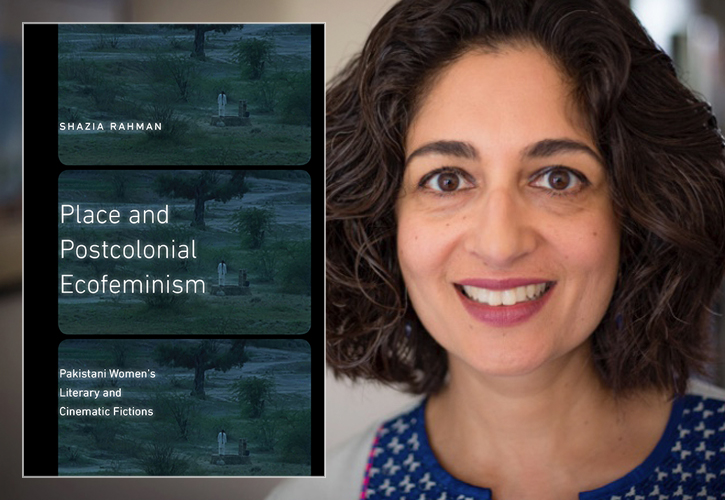College of Arts and Sciences Newsroom

Literary critic explores place and belonging in Pakistan
By Dave Larsen
Religious nationalism is the dominant discourse in Pakistan, which was created as a nation-state for the Muslims of British India in 1947. But when a nation’s boundaries are created by a former colonizer, how does that impact people’s sense of belonging, asks University of Dayton literary critic Shazia Rahman.
Rahman, who joined the College of Arts and Sciences faculty in August as a tenured associate professor of English, recently released Place and Postcolonial Ecofeminism: Pakistani Women’s Literary and Cinematic Fictions. Published by University of Nebraska Press, the book traces the ways in which Pakistani women explore alternative, environmental modes of belonging.
Through analysis of films such as Sabiha Sumar’s Khamosh Pani and Mehreen Jabbar’s Ramchand Pakistani, and novels that include Sorayya Khan’s Noor, Uzma Aslam Khan’s Trespassing and Kamila Shamsie’s Burnt Shadows, Rahman illuminates how these works simultaneously critique and counter stereotypes about Pakistan’s religious nationalism and oppressive patriarchy.
“Just because something is dominant and mainstream doesn’t mean it is all that is out there,” Rahman said. “I wanted to draw attention to less dominant voices, what women were saying and the ways in which they have a more environmental way of thinking about where they live and how they belong.”
The book grew out of Rahman’s teaching about postcolonial literature from around the globe. Previously, she spent 17 years at Western Illinois University, where she was a tenured full professor. After seeing news reports about Pakistan that largely focused on regional tensions and terrorist attacks, she developed a course in Pakistani literature to offer her students a different perspective.
“I want to humanize the people from this country, and what better way to do that than to have students read literature from that country and get to know the people,” she said. “As I started to do that, I found I had a lot to say about what I was teaching. ‘Maybe I should write all this stuff down and put it in a book.’ That’s how it came about.”
Rahman originally planned to call the book From Place to Displacement. Each chapter focuses on a different place in Pakistan and the last chapter addresses being displaced. However, her publisher and peer reviewers suggested she include all of her keywords in the title to help academics and students find it for use in their research. Hence, Place and Postcolonial Ecofeminism.
“The title is kind of boring, but I kept the word ‘place’ because I wasn’t willing to let go of that,” she said. “Even the introduction, it’s called ‘The Place That is Pakistan’ because it’s not necessarily the nation-state, it’s the place. The place is going to include landscapes, seascapes, the desert and mountains. It’s not man-made — international borders are man-made.”
For example, one chapter addresses the desert in India and Pakistan. The people who live in the desert feel they belong to the desert, and the nation-state isn’t as pressing to their way of thinking about where they live.
Rahman hopes her book will help people in the global North — the developed societies of Europe and North America — understand that people in the less developed and often poorer global South are not just passive consumers but are resisting the things that dominate and oppress them. She also would like to see Pakistan’s active women’s and environmental movements come together to address global climate change.
“There is a lot more going on than what you see on the news in Pakistan, she said. “Hopefully, my book will help you see the rest.”
Rahman holds a doctoral degree in English from the University of Alberta, Canada. She also holds master’s and bachelor’s degrees in English, both from the University of Toronto. Before joining the Western Illinois University faculty in 2002, she was an English instructor at both the University of Alberta and Florida International University.
Currently, she is teaching a global South Asian film course that includes two movies covered in her book, as well as a postcolonial literature course. During the spring 2020 semester, she plans to teach a research-based undergraduate course about Pakistani literature. She also looks forward to mentoring young faculty.
“Shazia Rahman is a distinguished postcolonial scholar and teacher and we could not be happier that she has decided to join the English department at UD,” said Andy Slade, associate professor of English and department chair. “We are excited to see what she will contribute to our existing programs in sustainability and human rights, to the major in English and to the campus generally.
“She has already shown herself to be an astute defender of the importance of stories and of the importance of listening to people’s stories to understand their view on the world as a parcel of the work for justice. I have seen what she has done already, and am looking forward to seeing what she does next.”
For more information, please visit the Department of English website.
